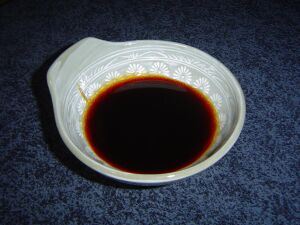Chemistry:Date honey
Date honey, date syrup, date molasses, Debes (Arabic: دِبس, pronounced [dibs]), or rub (Arabic: رُب, pronounced [rubb]; Hebrew: דְּבַש תמרים dvash tmarim or סילאן, silan; Persian: شیره خرما) is a thick dark brown, very sweet fruit syrup extracted from dates. It is widely used in Middle Eastern cuisine and Maghrebi cuisine.
Nutritional aspects
Date syrup is rich in the monosaccharides glucose and fructose.[1] This means that most of its sugar content is absorbed into the bloodstream, and it raises the blood glucose levels more efficiently and immediately than other syrups. It is therefore highly suitable for people suffering from hypoglycaemia, for those with sucrose intolerance or those with pancreatic problems who have difficulty absorbing disaccharides.[citation needed] Date syrup is higher in magnesium and potassium than some natural sweeteners such as maple syrup and honey, and it has been a popular alternative to sugar in recent years.[2] It is also rich in antioxidants due to its high phenolic and flavonoid content[3][4][5] and has been shown to exhibit anti-inflammatory activity.[6][7]
In national cuisines
It is used widely in Libya, usually with asida, a porridge-like dessert.
In Iranian and Iraqi cuisine, date syrup is used to sweeten tahini, consumed at breakfast. An alternative is grape syrup.
In Algeria, date syrup is used in desserts such as baghrir.
In the Middle East and Persian Gulf, date syrup is used for flavoring chicken and potatoes. They are rubbed in date syrup mixed with cardamom, salt, and olive oil, and then rolled in sesame before being fried in olive oil or baked it in the oven as a whole. Date honey is also used as a sauce for stuffed vegetables, such as onions and turnips, and as an ingredient in a semolina cake called basbousa, which gives the cake a honey-like taste.
Bangladesh produces around 20,000 tonnes of date molasses in each year. [8] The Kalkini Upazila region of Bangladesh is famous for its date juice and date molasses.
See also
- Pekmez
- List of syrups
References
- ↑ Bouhlali, Emiad dine Tariq; Derouich, Mgal; Meziani, Reda; Bourkhis, Boucha; Filali-Zegzouti, Younes; Alem, Chakib (2020). "Nutritional, mineral and organic acid composition of syrups produced from six Moroccan date fruit (Phoenix dactylifera L.) varieties". Journal of Food Composition and Analysis 93: 103591. doi:10.1016/j.jfca.2020.103591. https://www.sciencedirect.com/science/article/abs/pii/S0889157520302374.
- ↑ "Date Lady Nutrition Information". https://ilovedatelady.com/pages/nutrition-info.
- ↑ Abbès, Fatma; Kchaou, Wissal; Blecker, Christophe; Ongena, Marc; Lognay, Georges; Attia, Hamadi; Besbes, Souhail (2013). "Effect of processing conditions on phenolic compounds and antioxidant properties of date syrup". Industrial Crops and Products 44: 634–642. doi:10.1016/j.indcrop.2012.09.008. https://www.sciencedirect.com/science/article/abs/pii/S0926669012005158.
- ↑ Bouhlali, Emiad dine Tariq; Bammou, Mohamed; Sellam, Khalid; Benlyas, Mohamed; Alem, Chakib; Filali-Zegzouti, Younes (2016). "Evaluation of antioxidant, antihemolytic and antibacterial potential of six Moroccan date fruit (Phoenix dactylifera L.) varieties". Journal of King Saud University - Science 28 (2): 136–142. doi:10.1016/j.jksus.2016.01.002.
- ↑ Taleb, Hajer; Maddocks, Sarah; Morris, Keith; Kanekanian, Ara (2016). "The Antibacterial Activity of Date Syrup Polyphenols against S. aureus and E. coli". Frontiers in Microbiology 7 (198): 198. doi:10.3389/fmicb.2016.00198. PMID 26952177.
- ↑ Taleb, Hajer; Morris, Keith; Withycombe, Cathryn; Maddocks, Sarah; Kanekanian, Ara (2016). "Date syrup–derived polyphenols attenuate angiogenic responses and exhibits anti-inflammatory activity mediated by vascular endothelial growth factor and cyclooxygenase-2 expression in endothelial cells". Nutrition Research 36 (7): 636–647. doi:10.1016/j.nutres.2016.02.010. PMID 27333954. https://www.sciencedirect.com/science/article/pii/S0271531716000518.
- ↑ Bouhlali, Emiad dine Tariq; Hilaly, Jaouad El; Ennassir, Jamal; Benlyas, Mohamed; Alem, Chakib; Amamrouch, Mohamed-Yassine; Filali-Zegzouti, Younes (2018). "Anti-inflammatory properties and phenolic profile of six Moroccan date fruit (Phoenix dactylifera L.) varieties". Journal of King Saud University - Science 30 (4): 519–526. doi:10.1016/j.jksus.2017.08.011.
- ↑ Admin, Mr (2021-12-19). "Production of Molasses with Date Juice: Many rural people find source of livelihood" (in en-US). https://banglamirrornews.com/2021/12/19/production-of-molasses-with-date-juice-many-rural-people-find-source-of-livelihood/.
External links


